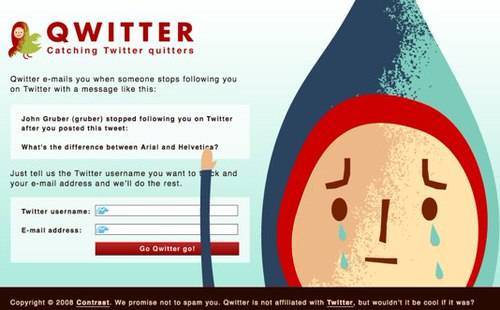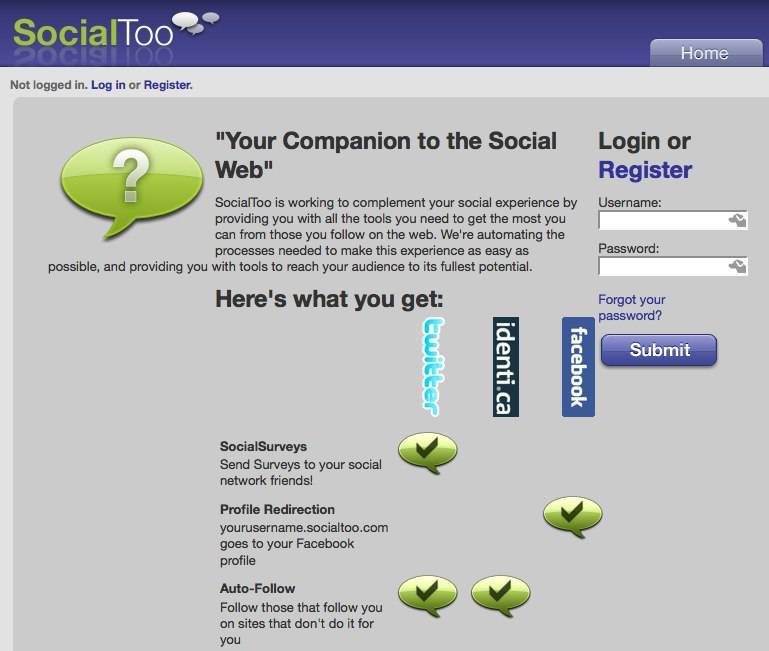The most extreme developers may find themselves left out in the cold.

Twitter watchers know that a large part of the service’s use comes through its Application Programming Interface (API) and that’s been a big part of what helped the young service grow. Now that the company has Britney Spears, CNN and Barack Obama among its ranks of users, though, developers seeking to push the limits of that API may soon find themselves no longer welcome.
Last night Twitter announced on its developer email list that API calls from a single IP will be limited to 20,000 per hour. Desktop clients and services seeking only status updates won’t be affected, only services pinging Twitter over and over again for information like users’ friends lists or other relatively unsupported data types will likely run up against the limit.
No More “I Dislike You Too” Lists
What does that mean? For now it means that a handful of services that notify users who has unfollowed them will be effectively non-viable. That’s far from our only concern about the issue, however.
Readers may remember a service called Qwitter, which emailed you every time someone unfollowed you on Twitter and told you what your last message posted was before that happened. On October 25th, a 15 year old UK blogger named “Joel D.” stopped following me after I tweeted about being tired in ceramics class, for example. I don’t hold a grudge but if you’ve got something against ceramics, Joel, then I say good riddance to you!
Seriously, though, a veil of paranoia and petty bitterness lifted from all of Twitter-dom just before Christmas when Qwitter finally gave up the ghost due to scalability issues on its end. (Apparently some people are still getting messages.) Update: Qwitter’s founder dropped by to tell us that the service is now back up. So head on over, masochists of Twitter.

Now a service called SocialToo has raised the alarm about the forthcoming limit and says that a similar feature it offers will disappear as well.
What The Developers Say
SocialToo complains that Twitter should let it pay for heavy access to the API if it won’t allow it for free, but Twitter apparently isn’t interested. Third party developers also say that if the API was made more efficient, they could get the information they needed with less wear and tear on Twitter.

These developers who are unhappy with the new policy complain that it will unfairly limit their companies’ growth, that it pulls the rug out from under supporters of the Twitter ecosystem and that it raises the possibility of Twitter reproducing the services they’ve worked hard to develop.
We’re less concerned about unfollowing notifications in particular than we are with the ability for developers to push the limits of accessing this incredible store of data to create unforeseen and otherwise impossible innovations.
What does Twitter have to say about this? We asked them.
What Twitter Says
We pinged Twitter headquarters for a comment and this is what Alex Payne, API Lead at Twitter, had to say.

We picked the 20,000 requests per hour number precisely because it effects the fewest applications (less than ten of the hosts we see in our hourly report of high-traffic consumers of our site). In most cases, these larger Twitter applications make requests from multiple IPs. Since each of their IPs gets its own 20k/hour allotment of
requests, the developers behind these big Twitter API projects shouldn’t have to lift a finger.
We’re constantly upgrading our API technologies and educating developers about offerings we already have that they may not know about, including the Search API, Data Mining Feed, and the upcoming “firehose” of all public tweets. We prioritize this work based on what’s going to have the most benefit for the broadest reach of applications.
The fact that 100% Twitter-powered companies like StockTwits are getting funding and expanding in popularity suggests that the Twitter API is meeting the needs of successful, growing businesses today.
At first we bought that explanation, but the more we thought about it the more doubt crept into our minds. That statement reads like a PR agent had a heavy hand in writing it.
Is Payne really saying that big companies will be fine, data that the company selectively exposes (tweets vs. profile data) will remain available and it’s only a handful of developers that will be impacted? What if in that handful of developers there are people who are working on building a game changing service that we as users will be really excited about? We love Twitter but our loyalties lie with the developer community that builds on top of its service first.
Maybe we’re wrong, though, and Payne’s response is reasonable. Maybe the handful of developers who want to ping Twitter to death are just loser freaks with too much time on their hands, not enough business development skills and nowhere near the style of Twitter’s new friends in Hollywood and on Madison Avenue! Really, though, maybe Twitter isn’t putting future innovation at risk in order to take the easy way out on scalability challenges. What do you think?










